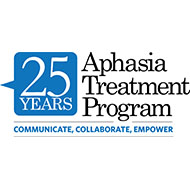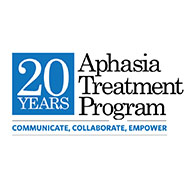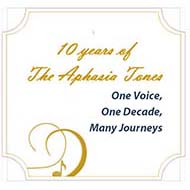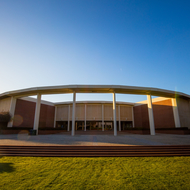Aphasia Treatment Program
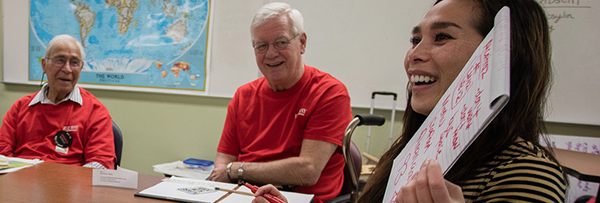
Description
The Department of Speech, Language, and Hearing Sciences and the Norma S. and Ray R. Rees Speech, Language and Hearing Clinic offers an innovative and cutting-edge group treatment program for persons with aphasia. The Aphasia Treatment Program (ATP) was established by CSD Professor Emerita, Dr. Jan Avent in 1996. The program is proudly founded on the principles of the Life Participation Approach for Aphasia, championed worldwide by leading aphasiologists (see Life Participation Approach to Aphasia). This approach places the life concerns of persons with aphasia at the heart of clinical decision-making. Further, this approach prioritizes the meaningful participation of persons with aphasia in society. ATP provides a rich social environment for persons with aphasia to interact with peers who have aphasia, graduate student clinicians, trained volunteers, and program faculty who are all nationally certified and state-licensed speech-language pathologists.
The ATP Leadership Team includes:
- Sophia Kanenwisher, ATP Director
- Michelle Gravier, ATP Research Director
- Stephanie Williams, ATP Clinical Supervisor
Interested in being a part of ATP?
- Submit a complete application.
- Turn it in to us by email or by mail.
- Email: clinic@csueastbay.edu
- We are not able to accept application pictures; please scan the application.
- Note: When you send us an application by email, the information that is sent is not necessarily encrypted. This means a third party may be able to access the information and read it since it transmitted over the internet.
- Mail: Cal State East Bay Rees Clinic, 25800 Carlos Bee Blvd. MB1099, Hayward CA 94542
- Email: clinic@csueastbay.edu
- Include supporting papers such as medical records.
- The application is not considered complete if supporting papers exist but are not provided.
- Wait for us to contact you, typically within 3 weeks.
- There is a $25 fee for an evaluation and a $50 per semester materials fee.
For further information, contact the clinic at (510) 885-3241 or clinic@csueastbay.edu
The Rees Clinic provides services both IN-PERSON and ON-LINE via TELEPRACTICE. If you have any questions, feel free to contact us at clinic@csueastbay.edu
TELEPRACTICE: Telepractice is the use of live-streaming to provide speech therapy, linking clinicians to clients who are an appropriate fit for this model. Telepractice is shown to be as effective as in-person consultation. Clinicians must follow the same Code of Ethics and Scope of Practice in Speech-Language Pathology, as well as state and federal laws. To participate, clients should have a device with camera and microphone, and reliable internet access. Clients who are under the age of 18 must have an adult present. Adult clients who would benefit from guided support should also have another adult present to help. If you have more questions about this model, please email us at clinic@csueastbay.edu.
If you are new to telepractice, we are happy to help you learn to navigate Zoom Health, our HIPAA compliant telepractice platform. We have aphasia-friendly guides to help you get started. There are a few important considerations:
- You will need a phone, tablet, computer with camera, or a laptop to join the video meeting
- You will need adequate internet access
- A quiet environment during therapy sessions is important
- You may need an E-helper, someone in your home that can help you with the technology during the session, especially when you first start
Logistics
There are three types of sessions available, offered in-person, on-line, or in a hybrid model that uses both. These are our Communication Groups, Exercise Groups, and the Aphasia Tones Choir. See more details below.
ATP Communication Groups: Graduate student clinicians facilitate a variety of 75 minute communication groups on Mondays and Wednesdays that promote conversational skills and social participation. Our groups are either theme based or encourage broader aspects of social communication. Sample groups may include Book Club, Headline News, Tech Groups, Daily Conversations, and Virtual Tours.
These groups accommodate individuals with a broad range of aphasia types and severity. ATP lead supervisors facilitate group placement to ensure appropriateness for each member. Members may sign up for one to four communication group sessions a week. Final group assignments are dependent on enrollment numbers, as some groups may close due to capacity. We try to keep the groups small (3-8 people) to allow for member connections and personalization.
ATP Exercise Groups: Our group is called LLAMA, or, Life-Long Activity and Movement for Aphasia. Led by faculty and students from the Kinesiology department, these sessions provide gentle movement and stretching exercises that can be done standing or sitting. We often use music to help us work out. The sessions meet from 10:00 - 10:50 a.m. on-line on Tuesdays and Thursdays, and in a hybrid model on Fridays. Each participant must complete a release to participate.
ATP Aphasia Tones Choir: The award-winning Aphasia Tones Choir meets in a hybrid model on Wednesdays from 2:00 - 3:30 p.m. Join the choir as members do physical and vocal warm-ups, rehearse popular songs, and enjoy community building social exchanges with the choir directors and other choir members. We create aphasia-friendly visuals to help our members practice. No previous singing experience is required. Come to have fun! To see the Aphasia Tones Choir performing their original song, go HERE. To read an interesting article about the Tones, go HERE.
Schedule
The schedule for Fall 2025 will be Mondays and Wednesdays, however, exact dates have not yet been determined. This page will be updated as soon as Fall clinic dates are available.
Our scheduled activities are posted closer to the start of ATP.
Cost
For our on-site services, nominal fees of $50.00 are charged as a materials fee. Payments can be made by cash, check, or credit card, and are accepted when services are provided. Telepractice therapy services offered by our Aphasia Treatment Program are supported by donations from the community.
We rely on and are grateful for your support. Donations can be submitted online at our Clinic Donations webpage. Under "Gift Designation", at "Direct my gift to", change the drop-down to "Other", and type in "Aphasia Treatment Program."
About Aphasia
Aphasia is a communication impairment that occurs most commonly after a stroke, but may also occur after a traumatic brain injury or brain tumor. It is estimated that approximately 2 million Americans and 400,000 United States troops returning from combat have aphasia. Individuals with aphasia typically have trouble with talking, understanding, reading and writing. However, aphasia does not affect a persons intelligence.
